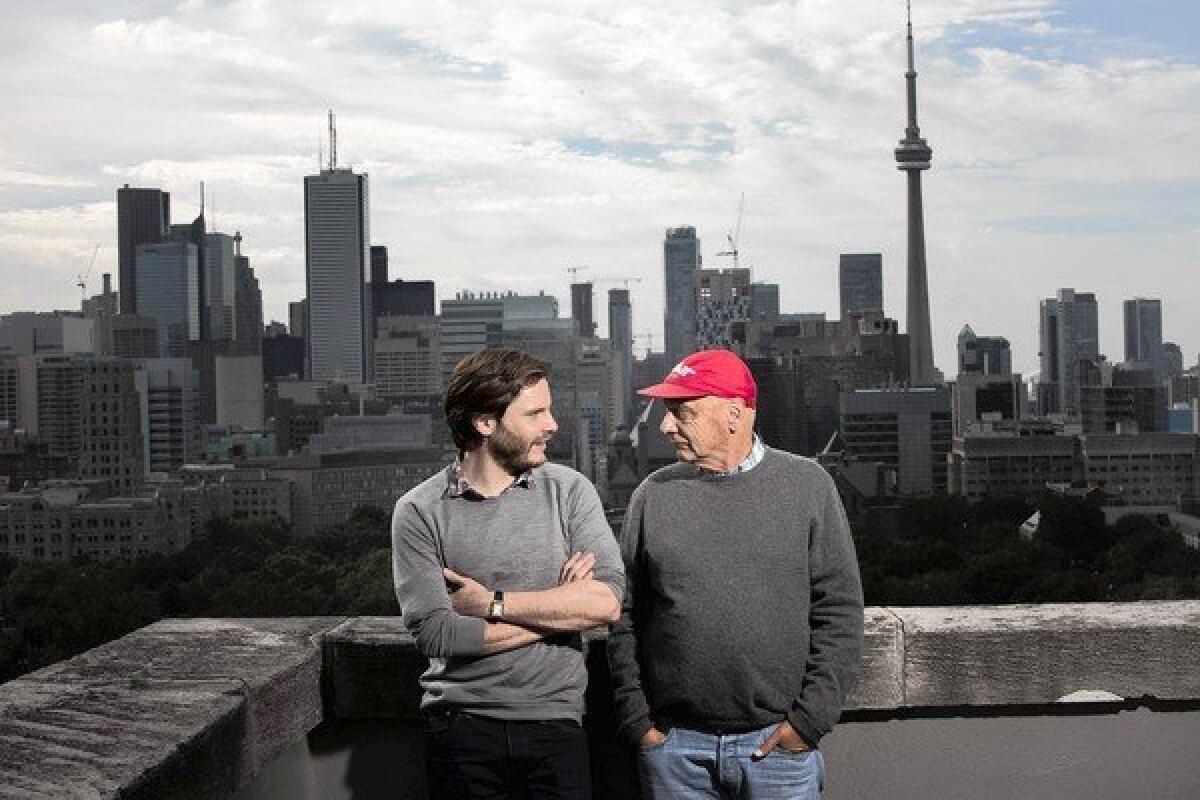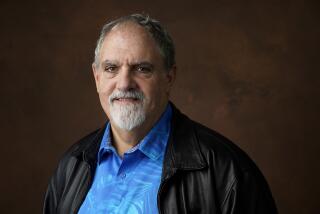Auto-racing film ‘Rush’ takes another route with Niki Lauda’s help

TORONTO — It was 37 years ago, but Niki Lauda recalls his brush with death as if it happened this morning.
The Austrian Formula One driver had been in a ferocious nip-and-tuck battle for most of the season with his British rival James Hunt when he crashed on a rain-slicked track at the German Grand Prix. Lauda, then 27, was trapped in his burning car for nearly a minute before he was pulled out by other drivers who stopped to help. The skin on his face was so badly burned that, at the hospital, a priest was called to administer last rites.
But a few days later, Lauda got up from his sickbed, signed a release and returned to his rural home.
PHOTOS: Toronto International Film Festival 2013 | The scene
“I remember hiding in my own house because there were photographers surrounding the place who wanted the first picture of me looking like this,” Lauda, now 64, said in an interview last week, gesturing to his still badly scarred face and ear. “But I had a bigger decision: Do I want to race or not? And I put a record on, and then I went down to the lake where I had a nice view, and I said, ‘This is the prime of my life, and thank God I’m alive and not dead. So yes, I’m going to race.’”
That decision proved one of the most remarkable in modern sports. Barely six weeks after an accident that should have killed him, Lauda showed up at the Italian Grand Prix at Monza — to Hunt’s great shock — and finished in the top 5. The battle with his nemesis was back on.
The clash between Lauda and Hunt — personal, professional, philosophical — is at the heart of Ron Howard’s Formula One drama “Rush,” in theaters Friday. Auto-racing movies tend to fall under several known genres: heightened action (the “Fast and Furious” franchise) or sports uplift (“Days of Thunder”). “Rush” peels off on a different course.
Written by Oscar nominee Peter Morgan — who spent months conferring with Lauda and poring over footage — the film examines its heroes primarily during that dramatic 1976 season. But while Howard crafts the races with sonic and visual style, he is equally preoccupied with characters’ personalities.
PHOTOS: Fall movie sneaks 2013
As shown in the movie, Hunt (played by Chris Hemsworth), driving for McLaren, was a swashbuckler, relying on natural talent more than mechanical savvy or hard work--and as interested in drinking and womanizing as in the nuances of the sport. Lauda (Daniel Bruhl), driving for the superior Ferrari, was a brilliant clinician, a disciplined practitioner who worked every mechanical detail to his advantage. Nicknamed “The Rat” because of his buckteeth, Lauda had a no-nonsense approach that made him as successful on the track as he was unpopular among fellow drivers off it.
Needless to say, there was no love lost between Lauda and Hunt, their rivalry a reminder of a far grittier sports era than the present, when competitors still genuinely resented each other (even though, as the movie suggests, they were also each other’s greatest motivating force).
“Young people today have no idea what happened in ‘76,” Lauda said with his trademark curmudgeonliness. He and Bruhl were at a rooftop restaurant at the Toronto International Film Festival, where “Rush” had premiered the night before. “It was two different people, two different approaches, one world championship.”
Bruhl added: “What I find great about the movie is you have empathy with both guys. It’s not a conventional film where you root for one person and not the other.”
PHOTOS: Celebrities by The Times
The actor said he was still trying to understand the risks Lauda took. Formula One was a loose, unregulated sport until the mid-’90s, and serious injuries and fatalities were common. (Fans of the documentary “Senna” will recall how that movie’s hero, the Brazilian champ Ayrton Senna, died on the track in 1994. Hunt survived his racing career but died of a heart attack in 1993 at age 45.)
Before the fateful German race, Lauda had argued for its cancellation; rain, he said, made conditions too dangerous. But in part because Lauda was a not-entirely-beloved guy on the circuit, he was outvoted by other drivers, including Hunt.
Bruhl was even more astounded by the comeback at Monza, which was so frightening that Lauda admits that during a test drive he had visions of his head being severed by a guardrail.
“It’s hard to find the right approach to think about what he did,” said Bruhl, the Spanish German actor known for his role as Nazi war hero Zoller in “Inglourious Basterds.” “You try to think about moments in life that are similar, but then you see how ridiculous the comparison is. Even how he analyzed his fear doesn’t seem human to me.”
To get himself in the proper frame of mind, Bruhl developed a bond with the three-time champion and worked him for off-the-record tidbits. He even accompanied him to the Brazilian Grand Prix, where in the paddock he met with current drivers such as the German champion Sebastian Vettel.
Bruhl also tried getting behind the wheel himself at a Formula Three course.
“There was a funny little accident where the wheel came off the fake Ferrari and I felt uncomfortable for a few seconds,” the actor recalled. “I always had a suspicion Ron [Howard] did it so I can get better in the part,” he said, laughing, then added, “It felt good to be in the real car but when the wheel came off you could see everyone from the film panicking. I think they were more concerned about the car than me.”
The actor said playing the part wasn’t easy for more elemental reasons — reasons that also made him resent Hunt. “I would get picked up at 3 in the morning and have to spend six or seven hours in the makeup trailer to get the prosthetics done. And then I would look at the call sheet and it would say ‘Chris: pickup at 10, first scene kissing a nurse, second scene making love on a plane. Third scene: Niki Lauda checking his tires.’”
“I made you suffer,” Lauda deadpanned.
“Rush” took root when Morgan’s Austrian wife, who knew Lauda because he had unsuccessfully asked her out more than three decades before, suggested a movie about Lauda and Hunt while the couple was vacationing in Ibiza. A few days later he and Lauda, who spends part of the year in Ibiza, were having lunch.
PHOTOS: Hollywood backlot moments
“To me, when I first heard it, this was a great story because you had a guy who is so prickly and so awkward and yet what he went through was so courageous,” said Morgan, known for bringing real-life figures like Queen Elizabeth II and Richard Nixon to life on the screen (in “The Queen” and “Frost/Nixon,” respectively). “So how about him in conflict with the most beautiful Englishman who ever lived?”
Though Morgan and Lauda developed a friendship, one meeting with Morgan had the driver concerned that he didn’t understand racing.
“Peter wrote down three sentences and said this is how I understood it,” Lauda recalled. “He said, ‘So you turn the key to the Ferrari.’ And I said, ‘Are you nuts? There is no key. You start with a button.’” He added. “I never had any worries with Peter. Except for the key.”
Lauda is as blunt in person as he is in the film, though he’s not without his playful side too. Describing the booing of the this season’s runaway leader Vettel by the Ferrari faithful at the Italian Grand Prix a few weeks ago, he remarked ‘”I said, be careful stupid Italians; if he would be in a Ferrari you would kiss his…”
And though Hunt was the flashy one, Lauda is not without his own larger-than-life flourishes. He arrived at the “Rush” premiere in Toronto from this year’s race at Monza by private jet that he flew himself. A few hours after the interview, he was scheduled to pilot it back home to Europe.
ON LOCATION: Where the cameras roll
He has undergone several kidney transplants, most recently receiving the organ from a flight attendant 30 years his junior who — oh yes — he married in 2008. (He and his first wife, Marlene Knaus, divorced in 1991.)
Lauda continues to work as a Formula One commentator in Europe and serves as an elder statesman for the sport. He is non-executive chairman for the Mercedes F1 team, where he mentors other drivers, including, in an ironic twist, the talented young Brit Lewis Hamilton.
Whether NASCAR-crazed Americans will see a film about Formula One remains a question. That’s perhaps why the movie, although it’s a Universal Pictures release, was financed for under $45 million and was funded outside the studio by entities such as Cross Creek Pictures and Exclusive Media.
Reviews for “Rush” have been strong, and the early fan buzz, especially among F1 devotees, is good too. At a Toronto party for the movie, young men and women lined up at a table where Bruhl, Hemsworth and Lauda were sitting. Surprisingly, they took as many photos with Lauda as they did with the two actors.
“You have a new career as a movie star,” Bruhl later ribbed him. Lauda waved his hand dismissively. “No, never,” he said.
But then Lauda got reflective about racing.
“James could have won a lot of championships if he had the discipline. He had the natural talent. He could have made my life much more difficult.” the driver said. Then he added with Laudia-esque matter-of-factness, “Thank God he went the other way.”
.steve.zeitchik@latimes.com
More to Read
Only good movies
Get the Indie Focus newsletter, Mark Olsen's weekly guide to the world of cinema.
You may occasionally receive promotional content from the Los Angeles Times.











